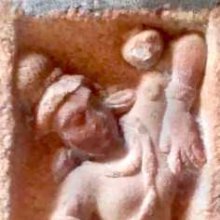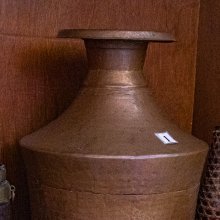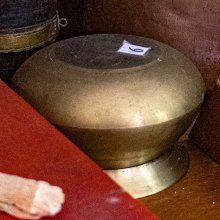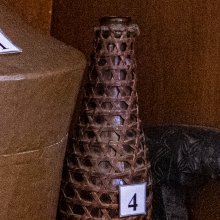Kuta, Kuṭa, Kūṭa, Kūṭā: 35 definitions
Introduction:
Kuta means something in Buddhism, Pali, Hinduism, Sanskrit, Jainism, Prakrit, the history of ancient India, Marathi, Hindi, biology, Tamil. If you want to know the exact meaning, history, etymology or English translation of this term then check out the descriptions on this page. Add your comment or reference to a book if you want to contribute to this summary article.
Kuta has 33 English definitions available.
Images (photo gallery)
(+11 more images available)
Languages of India and abroad
Sanskrit dictionary
[Deutsch Wörterbuch]
Source: Cologne Digital Sanskrit Dictionaries: Böhtlingk and Roth Grosses Petersburger WörterbuchKuṭa (कुट):—
--- OR ---
Kuta (कुत):—m. Nomen proprium eines der 18 Diener des Sonnengottes, mit dem Meeresgotte identif. [VYĀḌI] zu [Hemacandra’s Abhidhānacintāmaṇi 103.]
--- OR ---
Kūṭa (कूट):—
--- OR ---
Kūṭa (कूट):—
--- OR ---
Kuṭa (कुट):—
4) n. [Halāyudha 2, 136.] — Vgl. mālākuṭadantī .
--- OR ---
Kūṭa (कूट):—1.
3) aṃsa [Kathāsaritsāgara 98, 61.] prekṣaṇa ist nach [Śabdakalpadruma] Augapfel. —
5) bhasma [Mahābhārata 12, 4225.] [Scholiast] zu [Kātyāyana’s Śrautasūtrāṇi 25, 8, 2.] karaṅka [Kathāsaritsāgara 103, 10.] Zerbröckeltes (von Holz u.s.w.) Schol. zu [Kātyāyana’s Śrautasūtrāṇi 21, 2, 6.] —
9) hierher vielleicht [Scholiast] zu [Kātyāyana’s Śrautasūtrāṇi 1, 1,] [?12; vgl. Weber’s Indische Studien 10, 13.] —
10) prahelikāpahnutikūṭākhyāna (vgl. kūṭakākhyāna) [Oxforder Handschriften 123,a,11.] heman falsches Gold [Naiṣadhacarita 22, 52.] lekha [Kathāsaritsāgara 124, 198.] tāpasa [121, 172. 71, 171. 177.] mūlādisnehakūṭairvyavaharati vaṇik [Varāhamihira’s Bṛhajjātaka 14, 3.] sattva (= sattvābhāsa [Scholiast]) [Bhāgavatapurāṇa 10, 12, 19.] —
16) m. Bez. einer best. Constellation d. i. wenn alle Planeten (Sonne und Mond incl.) in den Häusern 4, 5, 6, 7, 8, 9 und 10 stehen, [Varāhamihira’s Bṛhajjātaka 12, 8. 16.] —
17) m. Bez. einer Unterart des Grahayuddha [Sūryasiddhānta 7, 22.] —
18) mystische Bez. des Buchstabens kṣa [WEBER, Rāmatāpanīya Upaniṣad 314. 315. 319.] —
19) m. Nomen proprium eines von Viṣṇu besiegten Feindes [Rāmāyaṇa 7, 23, 1, 41.] [Bhāgavatapurāṇa 10, 42, 37. 44, 26.] — Vgl. noch āmra, gṛdhra, citra, maṇi, ratna, vamrī, haṃsa, hima .
--- OR ---
Kūṭa (कूट):—2. [Pañcaviṃśabrāhmaṇa 21, 14, 16.] [Kāṭhaka-Recension 15, 4. 24, 1.] [Scholiast] zu [Kātyāyana’s Śrautasūtrāṇi 6, 3, 19.] m. = ukṣā bhagnaśṛṅgaḥ [Halāyudha 2, 112.]
--- OR ---
Kūṭa (कूट):—1.
9) füge Fussangel hinzu.
Source: Cologne Digital Sanskrit Dictionaries: Sanskrit-Wörterbuch in kürzerer FassungKuṭa (कुट):—(*m.) —
1) vielleicht Haus , Familie [Ṛgveda (roth). 1,46,4.] = kṛta [Nirukta] auch *n. —
2) *Wasserkrug. Auch n. —
3) *Festung. —
4) *Hammer , Axt ([Galano's Wörterbuch]) —
5) *Baum. —
6) *Berg. —
7) *Nomen proprium eines Mannes.
--- OR ---
Kūṭa (कूट):—1. —
1) n. das Stirnbein mit seinen Vorsprüngen , Horn. —
2) m. n. Kuppe [Bhāgavatapurāṇa 3,13,29.] Spitze überh. [Rāmāyaṇa 6,95,24.] —
3) Spitze , so v.a. der Vornehmste — , Erste unter (Gen.). —
4) n. ein best. Geräthe —
5) (*m. *n.) ein eiserner Hammer [Mahābhārata 16,4,6.] —
6) *m. n. ein best. Theil des Pfluges. —
7) m. eine Art Halle oder Tempel ( maṇḍapa) [Hemādri’s Caturvargacintāmaṇi 1,188,15.189,23.779,6,11.] —
8) m. n. Haufe , Menge. —
9) (*m. *n.) Fussangel , Fallstrick , Falle (auch in übertr. Bed.). —
10) n. verfälschte Waare [Varāhamihira’s Bṛhajjātaka 14,3.] —
11) (*m.) n. Täuschung , Trug , Unwahrheit. —
12) m. eine best. Constellation. —
13) m. eine Unterart des Grahayuddha. —
14) m. mystische Bez. des Lautes kṣa. —
15) *m. n. Unbewegliches , Unveränderliches. —
16) *m. n. Wasserkrug. —
17) *m. n. eine best. Pflanze. —
18) *m. die Mitte eines Elephantenzahns [Galano's Wörterbuch] —
19) *m. f. Haus. —
20) *m. Beiname Agastya's. —
21) m. Nomen proprium eines Feindes des Viṣṇu.
--- OR ---
Kūṭa (कूट):—2. —
1) Adj. (f. ā) — a) ungehörnt vom Rinde , welches nur unvollkommene Fortsätze des Stirnbeins hat. — b) trügerisch , falsch , verfälscht , hinterlistig. —
2) *m. ein Stier mit abgebrochenen Hörnern.
Sanskrit, also spelled संस्कृतम् (saṃskṛtam), is an ancient language of India commonly seen as the grandmother of the Indo-European language family (even English!). Closely allied with Prakrit and Pali, Sanskrit is more exhaustive in both grammar and terms and has the most extensive collection of literature in the world, greatly surpassing its sister-languages Greek and Latin.
See also (Relevant definitions)
Starts with (+491): Kuta kuta, Kuta Sutta, Kuta-malainatu, Kuta-pam-pir-kaiitu, Kuta-vantiati, Kuta-vantivai, Kutabandha, Kutabandham, Kutabheda, Kutabhi, Kutabhuta, Kutabuli, Kutaca, Kutaca-p-palai, Kutacadi, Kutacakam, Kutacalam, Kutacam, Kutacan, Kutacanmali.
Ends with (+386): Abbhakuta, Abeokuta, Abhrakuta, Accu, Adakilkuta, Adakuta, Adrikuta, Agastyakuta, Agnikukkuta, Akshakuta, Akshikuta, Akuta, Alakuta, Ambukukkuta, Amrakuta, Amsakuta, Anabhibhutamakuta, Ankuta, Annakuta, Antarakuta.
Full-text (+721): Kutas, Kutaja, Uda, Kutagara, Amsakuta, Kutaksha, Citrakuta, Kutayantra, Kutashasana, Kutam, Kutasvarna, Kutashalmali, Kalakuta, Jimutakuta, Kutatula, Ratnakuta, Arakuta, Kutarthabhashita, Hamsakuta, Akuta.
Relevant text
Search found 115 books and stories containing Kuta, Kooda, Koodaa, Kuda, Kudaa, Kuṭa, Kūṭa, Kuṭā, Kūta, Kūṭā; (plurals include: Kutas, Koodas, Koodaas, Kudas, Kudaas, Kuṭas, Kūṭas, Kuṭās, Kūtas, Kūṭās). You can also click to the full overview containing English textual excerpts. Below are direct links for the most relevant articles:
Garga Samhita (English) (by Danavir Goswami)
Verse 5.8.10 < [Chapter 8 - The Killing of Kaṃsa]
Verse 1.6.22 < [Chapter 6 - Description of Kaṃsa’s Strength]
Verse 5.7.12 < [Chapter 7 - The Killing of Kuvalayāpīḍa]
Vishnudharmottara Purana (Art and Architecture) (by Bhagyashree Sarma)
5. Different Parts of a Temple < [Chapter 4 - Temple Building]
4. The Viṣṇudharmottara-purāṇa and Temple Architecture of India < [Chapter 6 - Modern Relevance of Different Art Forms and Architecture]
6. Different Types of Temple < [Chapter 4 - Temple Building]
Kashyapa Shilpa-shastra (study) (by K. Vidyuta)
4. Fourteen types of Samāśra (Square) Maṇḍapas < [Chapter 4 - Maṇḍapa Lakṣaṇa]
5. Measurement for the Storeys of the Gopuras < [Chapter 5 - Gopura Lakṣaṇa]
4 (b). Technical terms for the component parts of the temple < [Chapter 2 - Author and his Works]
Rig Veda (translation and commentary) (by H. H. Wilson)
Bhakti-rasamrta-sindhu (by Śrīla Rūpa Gosvāmī)
Verse 1.1.23 < [Part 1 - Qualities of Pure Bhakti (bhagavad-bhakti-bheda)]
Verse 4.8.70 < [Part 8 - Compatible & Incompatible Mellows (maitrī-vaira-sthiti)]
Verse 4.4.12 < [Part 4 - Compassion (karuṇa-rasa)]
The Skanda Purana (by G. V. Tagare)
Chapter 20 - Description of Dharā Kṣetra < [Section 2 - Dharmāraṇya-khaṇḍa]
Chapter 350 - Greatness of Durga-Kūṭa Gaṇapati < [Section 1 - Prabhāsa-kṣetra-māhātmya]
Chapter 352 - Greatness of Suparṇelā < [Section 1 - Prabhāsa-kṣetra-māhātmya]
Related products







